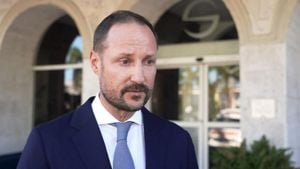At COP29, climate finance negotiations have hit significant woes, leaving room for quite the drama just as the world grapples with rising temperatures and fierce weather patterns. The meeting, taking place amid the grand setting of Baku, Azerbaijan, finds itself at a tipping point as delegates rush against the clock. It has become increasingly clear: the headlines might just be dominated by dollars and cents, or the glaring absence of commitments to put forth the necessary financial support for developing nations grappling with the climate crisis.
This summit, often dubbed the "Finance COP," spotlighted the perennial challenges of finance, adaptation, and the all-too-urgent need for richer nations to step up their game. It echoes the 2009 COP15 meeting, where developed nations promised to mobilize $100 billion annually by 2020 to help developing countries tackle climate crises. Fast forward, and many nations are still left scratching their heads, frustrated by the unmet promises and dwindling financial support. The Organisation for Economic Cooperation and Development (OECD) claims milestones have finally been reached, but developing countries are skeptical, asserting they've yet to see equitable resources according to their absolute needs and priorities.
A recent framework distributed at COP29 presented competing figures: funding proposals ranged from a modest $100 billion to as high as $2 trillion, depending on whom you ask. Although the document, upon release, noted progress was limited, pressure mounts as time ticks away before the summit's conclusion on November 22. "It’s concerning we don’t have substantial figures on the table yet," sighed one negotiator, highlighting the growing discord between developed and developing countries amid these discussions.
The Multilateral Development Banks (MDBs), the primary climate finance providers, announced they intend to increase funding to low and middle-income nations by about 61% by 2030, totaling around $120 billion annually by then. This increase includes $42 billion dedicated to adaptation programs. But is it enough? Many African delegates have raised their voices, calling out the inadequate adaptation funds, arguing for greater clarity on how financial flows are tracked and the urgency to meet their national climate action commitments.
A significant report by the Independent High-Level Expert Group on Climate Finance urged for at least $1 trillion to be dedicated each year to aid developing countries, with the figure expected to rise to $1.3 trillion by 2035. It highlights the undeniable challenge of meeting these financial goals against the backdrop of dwindling global solidarity, as recent political shifts, such as Argentina's withdrawal from the talks, add another layer of complexity to achieving universal commitment.
Several activists from nations familiar with these struggles are vocal against perceived shortcomings of rich nations. Harjeet Singh from the Fossil Fuel Non-Proliferation Treaty Initiative characterized the scenario poignantly, calling out the hypocrisy of developed nations extracting fossil fuels, all the meanwhile pushing developing countries toward renewable transitions with scant support. "They are making the transition undue hardships for us, compelling nations to tackle monumental climate challenges alone," he stressed.
Adding to these tensions are the contents of the latest draft negotiations, which do not adequately address three primary pillars of climate action: adaptation, mitigation, and loss and damage. While negotiations aim to keep financial commitments accessible and effective, criticisms abound on how the funding mechanisms remain overly complex and slow. Further complicate matters, many believe accountability mechanisms need to be fortified to guarantee developing countries are fortified against climate impacts.
It’s worth noting the paradox on the ground. While the negotiations seem tangled, the concern over transparency and the quality of climate finance is echoing far and wide. Light has been shed on the importance of high-quality financing — ones characterized by accessibility and effective implementation. Countries caution against lumbering bureaucracies which purportedly delay the delivery of financial aids when they are needed the most.
Jochen Flasbarth, Germany’s development minister, urged the delegates to unify and find common ground, emphasizing the pressing reality of stark global crises looming over them. He pointed out the visible fragility of global solidarity, considering the crises and warfare threatening various nations. "Postponing the decision here isn’t wise," Flasbarth warned, particularly with expected changes looming with the upcoming US elections and varying political landscapes affecting climate commitment.
Yet, the discussion is more than merely financial commitments; it’s shaping how nations perceive and assign responsibilities—who pays, who must adapt, and who benefits from climate funding. The tussle over exactly which nations will shoulder the burden appears unending, as both sides continue to cover familiar arguments without yielding clear paths forward.
Meanwhile, the influence of fossil fuel companies remains palpable at COP29. Reports indicated such corporate interests outnumber the representatives from the ten most vulnerable countries combined. Activists see this imbalance as detrimental, arguing it undermines the seriousness of the conference by granting undue influence to profit-driven entities.
With the clock ticking down to the conference end, the atmosphere is tense but charged with hope. Advocacy groups insist momentum is still possible, with many still believing COP29 can reach significant outcomes if there is sincere collaboration across both sides. Yet, for this transformation to occur, it will require listening and deepening genuine engagement—a tall order faltering beneath distressing realities faced by the most vulnerable populations world over.
What happens next remains uncertain. But as stakes increasingly rise, the need for tangible climate financing commitments is more important than ever. Flasbarth and his counterparts will need to deliver clarity sooner rather than later if there’s any hope of achieving meaningful progress out of COP29. No matter the challenges, the dialogue must continue—and this is just the beginning.



